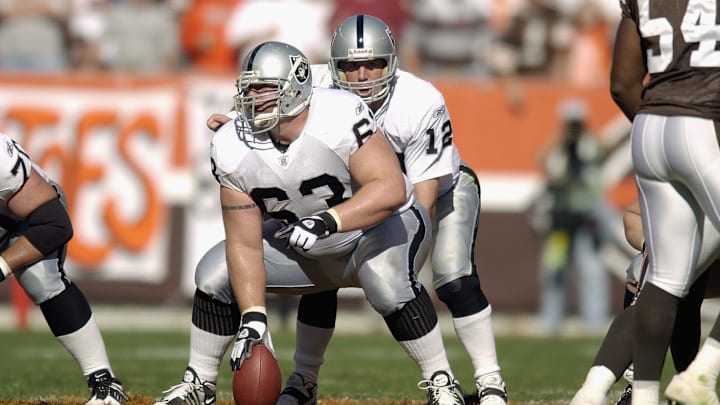The Oakland Raiders had been building a solid program under head coach Jon Gruden from 1998 to 2001. A strange series of events, however, led to Gruden being traded from Oakland to the Tampa Bay Buccaneers before the 2002 NFL season.
Gruden's replacement, Bill Callahan, was actually the one who got the Silver and Black over the hump. After two early postseason exits in 2000 and 2001 with Gruden, Callahan and the Raiders blew through the AFC playoffs in 2002 en route to an appearance in Super Bowl XXXVII.
Awaiting Oakland in that Super Bowl, as history would have it, was Gruden and the Buccaneers. At Qualcomm Stadium in San Diego, California, Tampa Bay dominated the Raiders by a score of 48 to 21 despite Oakland being four-point favorites.
This brutal collapse by the Silver and Black was a tough pill for the organization to swallow. But there were some unusual circumstances surrounding the team ahead of the biggest game of the year, and one player in particular may have cost the team their chance at a Super Bowl ring.
Barret Robbins cost the Raiders Super Bowl XXXVII against the Buccaneers
After blowing out both the New York Jets and Tennessee Titans, the Raiders had just six days to prepare for the Buccaneers. One day before the game was played, however, Oakland's starting center, Barret Robbins, was inexplicably reported missing.
Robbins was a stalwart on the team's offensive lines for the last eight seasons and was in the midst of a Pro Bowl and First-Team All-Pro campaign in 2002. He finally re-emerged the evening before the Super Bowl, but was so disoriented that he did not know where he was or who he was with.
While playing collegiately at TCU, Robbins had been misdiagnosed with depression when, in reality, he suffered from bipolar disorder. He had neglected to take the proper medication in the week leading up to the Super Bowl and was ultimately suspended by Callahan for the game.
Legendary owner Al Davis and coach Willie Brown worked with him on the morning of the game to try and help him recover, but they were unable to help him into a state where he was able to play. This left Adam Treu as the team's starting center despite just having 14 NFL starts under his belt.
MVP quarterback Rich Gannon was unable to orient himself with all of the chaos surrounding the Raiders, and he put together the worst performance of his career. He threw five interceptions, fumbled once and was sacked five times by Tampa Bay's defense in the blowout loss.
RELATED: The painful story of the worst season in Raiders franchise history
It was later discovered that Robbins had spent the day before the Super Bowl partying across the border in Tijuana, Mexico. He was under the impression that the Raiders had already won the Super Bowl, so he was celebrating.
Ultimately, Robbins was able to recover his starting position for the 2003 season, but he eventually got released after he and several of his teammates were busted for taking performance-enhancing drugs. He never played in the NFL again.
In the years that followed, Barret continued to struggle with his mental health and substance abuse, which led to several physical altercations and arrests. He has done several stints in jail and rehab facilities since leaving the NFL in 2003.
While it is disappointing that players like Gannon, Tim Brown, Charlie Garner and Charles Woodson never got to win a Super Bowl in the Silver and Black, this story is truly about the importance of athletes taking care of their mental health and any issues they have, both on and off the field.
The iconic former CEO of the Raiders, Amy Trask, said it best when it pertained to how things went down on that fateful day.
"We had another challenge, and it's very, very sad," Trask said. "Yes, it absolutely impacted us on the field, but it also impacted a human life. ... When they chose to sit Barret, they harmed the whole team."
